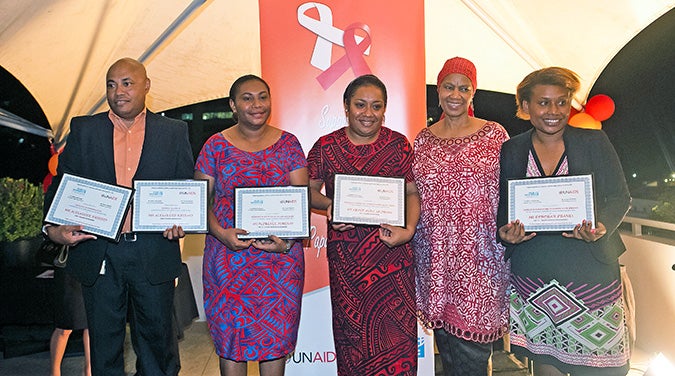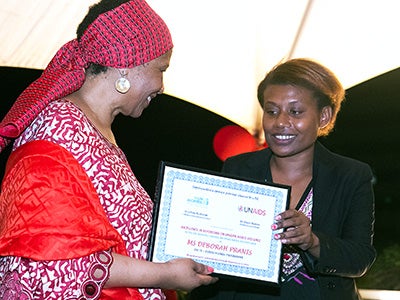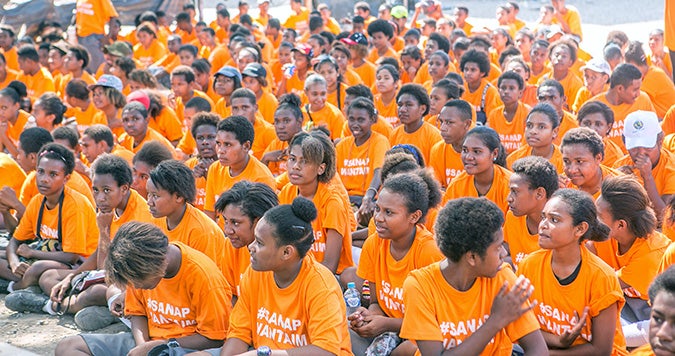Writing for Change: UN Women Executive Director awards journalists who bring to light the stories of HIV and gender-based violence
Date:
Author: Ornwipa Rugkhla
Port Moresby, Papua New Guinea - On World AIDS Day today, UN Women Executive Director Phumzile Mlambo-Ngcuka is in Papua New Guinea’s capital, Port Moresby, to award journalists for outstanding reporting on the relationship between HIV/AID and gender-based violence.

Papua New Guinea (PNG) has one of the highest prevalence of HIV and gender-based violence (GBV) in the world. According to the recently published report by UN Women Regional Office for Asia and the Pacific, HIV and Gender-Based Violence are deeply intertwined. GBV increases the risk of HIV by limiting factors for women with regards to negotiating safer sex. Where women are disproportionately infected with HIV, they are reportedly less likely capable of negotiating condom use. At the same time, people living with HIV experience high levels of GBV. Both issues are highly stigmatized and many women living with HIV who are subjected to GBV do not seek help due to fear of discrimination.
With an aim of increasing awareness and advocating on these issues, UN Women and UNAIDS established the Annual Media Award for Excellence in Reporting on HIV and Gender-Based Violence 2015 to honour in outstanding journalism each year, with the theme of “Tell the Bigger Picture” to illustrate the complex interplay between these issues and many other issues in PNG including lesbian, gay, bisexual, transgender, intersex persons, witchcraft and sorcery. In attendance were over 100 journalists from 16 media outlets across the country.
"World Aids Day happens in the middle of 16 Days that's why we're in orange,” Ms. Mlambo-Ngcuka stated in her address at the award ceremony. “The year 2030 is the year that we want to end HIV and gender-based violence … more work needs to be done with young women and young people to encourage and motivate more people to join the fight.”
Around 50 per cent of new HIV infections among young persons aged 15-24 occurred among adolescent girls and young women in Papua New Guinea.
During her speech, Ms. Mlambo-Ngcuka highlighted the key role in which the media plays as educators and advocates for the issues: “I have been informed that the media in Papua New Guinea is very responsive to the epidemic of HIV and the pandemics of gender-based violence and I congratulate the media in its many forms for taking this responsibility.”
Ms. Mlambo-Ngcuka also acknowledged that making a stand for what is right can lead to repercussions as many journalists shared stories where they received threats for their coverage. She urged them to fight on, ‘When we fall, we fall forward. Then we get up again and keep on fighting.”

The awardees were Ms. Florence Jonduo who received the recognition for her story on the transgender women living with HIV; Mr. Alexander Rheeney for best editorial; Grace Auka for excellence in reporting; and Ms Deborah Prantis, who received the first prize for excellence in reporting on GBV in her TV programme. Ms. Prantis told the story of ‘Angelina’, a woman who was accused of sorcery and was consequently murdered by her family in 2013. None of those who murdered her were arrested.
In a conversation with UN Women’s Executive Director, Ms. Prantis explained the reason behind her conviction, “I asked myself, who would speak for Angelina. Then I decided that I would speak for Angelina and for all the women who have been tortured.”
Unwanted, forced sex is a global problem facing women and girls. Research shows us that violence against women and girls increases their risk of acquiring HIV. And women who are living with HIV are more likely to experience violence as a result of their zero status.
